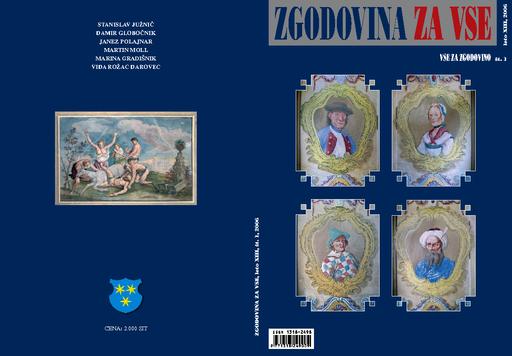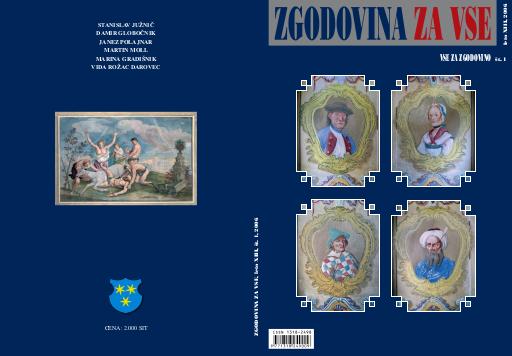
/
Serijske publikacije
/
Zgodovina za vse
Kvaren in umazan tisk
Zavzemanje za »boljši« tisk pred prvo svetovno vojno

Avtor(ji):Janez Polajnar
Soavtor(ji):Andrej Studen (ur.)
Leto:2006
Založnik(i):Zgodovinsko društvo, Celje
Jezik(i):slovenščina
Vrst(e) gradiva:besedilo
Ključne besede:krščanska morala, etika, tisk, leposlovje, 19.st., printed matter, Christian morality, Slovenia, 19th century
Avtorske pravice:

To delo avtorja Janez Polajnar je ponujeno pod Creative Commons Priznanje avtorstva-Nekomercialno-Brez predelav 4.0 Mednarodna
Datoteke (1)

Ime:2006_1_Zgodovina-za-vse.pdf
Velikost:3.20MB
Format:application/pdf
Stalna povezava:https://hdl.handle.net/11686/file299
Opis
Pojmovanje romana in drugega neprimernega leposlovja kot enega izmed krivcev za pohujšanje mladine je bila stalnica
pri moralistih in njihovih prizadevanjih za nravno čistost prebivalstva. V drugi polovici 19. stoletja se je tisk vseh zvrsti precej
razširil med prebivalstvom. Moralisti so poseben problem videli v šundu in ostali trivialni literaturi, ki je omrežila mnogo
bralcev. Ocenjevali so, da preveč razvnema domišljijo bralcev in da jih zavaja v pohujšanje, saj popularizira razmerje, ki je
brez objektivnega ozadja in realnega namena. Obravnava spornih, moralno občutljivih tem v delih, ki so bila dostopna širši
javnosti, pa je bila nezaželena tudi v okviru »resne« literature in je pri večini kritikov naletela na negativen odziv. Moralisti
so iskali pomoči za nadzor pri državnih oblasteh, vendar so te pozornost posvečale predvsem prekrškom, ki so bili politične
narave, zato je med ohranjenim zaplenjenim tiskovnim gradivom Državnega pravdništva najti relativno malo spisov z obravnavano
tematiko.
Metapodatki (12)
- identifikatorhttps://hdl.handle.net/11686/2080
- naslov
- Kvaren in umazan tisk
- Zavzemanje za »boljši« tisk pred prvo svetovno vojno
- Pernicious and filthy printed matter
- Endeavours for »better« prints before WW1
- Schadliche und schmutzige Druckerzeugnisse
- avtor
- Janez Polajnar
- soavtor
- Andrej Studen (ur.)
- predmet
- krščanska morala
- etika
- tisk
- leposlovje
- 19.st.
- printed matter
- Christian morality
- Slovenia
- 19th century
- opis
- Blaming the novel and other »inappropriate« literature as one of the main factors contributing towards the corruption of Slovenia's youth was a constant amongst the moralists and their efforts to keep the nature of the general public pure. In the second half of the 19th century, printed matter of all genres became far more readily available to the population. The moralists saw this as a potential problem – particularly in the case of penny-dreadfuls and other forms of light reading, which held the fascination of a large number of readers. Their main objection was that such works roused the imagination of the readers far too much and corrupted their morals, as, in their opinion, such literature popularised relationships without any proper objective backgrounds and decent intent. The treatment of delicate moral issues in the works that were accessible to the greater public was also considered undesirable in »serious« literature and elicited a negative response from the majority of the critics – not just the moralists. The moralists appealed to the national authorities to provide them with assistance in controlling the content of all such publications. However, the authorities were concerned primarily with violations of a political nature, and since this was where their primary focus lay, relatively few works that were the subject of such debates can be found amongst the confiscated printed matter kept by the Public Prosecutor's Office.
- Pojmovanje romana in drugega neprimernega leposlovja kot enega izmed krivcev za pohujšanje mladine je bila stalnica pri moralistih in njihovih prizadevanjih za nravno čistost prebivalstva. V drugi polovici 19. stoletja se je tisk vseh zvrsti precej razširil med prebivalstvom. Moralisti so poseben problem videli v šundu in ostali trivialni literaturi, ki je omrežila mnogo bralcev. Ocenjevali so, da preveč razvnema domišljijo bralcev in da jih zavaja v pohujšanje, saj popularizira razmerje, ki je brez objektivnega ozadja in realnega namena. Obravnava spornih, moralno občutljivih tem v delih, ki so bila dostopna širši javnosti, pa je bila nezaželena tudi v okviru »resne« literature in je pri večini kritikov naletela na negativen odziv. Moralisti so iskali pomoči za nadzor pri državnih oblasteh, vendar so te pozornost posvečale predvsem prekrškom, ki so bili politične narave, zato je med ohranjenim zaplenjenim tiskovnim gradivom Državnega pravdništva najti relativno malo spisov z obravnavano tematiko.
- Schadliche und schmutzige Druckerzeugnisse Gattung den katholischen Glauben und die katholische Wahrheit verbreiten. Für die Moralisten und ihre Bestrebungen um die moralische Reinheit der Bevölkerung waren der Roman und andere unangemessene Literatur einer der Schuldigen für das sittliche Verderben der Jugend. Man nahm daran Anstoß, dass weder die Liebe zu Gott noch der Geist des Katholizismus Leitgedanken der Bücher waren. Bücher sollten als Lehre und als Vorbild für das Volk dienen. Auch im Rahmen der „seriösen“ Literatur war in Werken, die der breiteren Öffentlichkeit zugänglich waren, die Behandlung strittiger, moralisch sensibler Themen unerwünscht und stieß bei der Mehrheit der Kritiker auf ein negatives Echo. Das zeigen der Roman Hiša Marije Pomočnice [Das Haus der Barmherzigkeit] von Ivan Cankar und das Drama Sad greha [Die Frucht der Sünde] von Engelbert Gangl. Die Tagespresse bereitete den Hütern der Moral in ihrem Kampf für die allgemeine moralische Reinheit ebenfalls Kopfzerbrechen. Der wachsende Absatz von Zeitungen und Büchern war ein schwerer Brocken für die Erzieher der Moral und die staatliche Zensur. Die Forderungen der Moralisten an die staatlichen Organe, sie mögen strenger gegen die Verbreitung von schädlichen Druckwerken vorgehen, wurden daher ständig wiederholt. Offensichtlich aber kontrollierte der Staat die Publikationen eher wegen verschiedener politischer Vergehen als wegen der öffentlichen Moral. Außerdem ließ die Auslegung des Gesetzes, das die Verbreitung von Druckwerken verbot, die die Moral oder das Schamgefühl verletzten und öffentliches Ärgernis erregten, auch einigen Spielraum und hing vom Zensor oder demjenigen, der Anzeige erstattete, ab.
- založnik
- Zgodovinsko društvo
- datum
- 2006
- tip
- besedilo
- jezik
- Slovenščina
- jeDelOd
- pravice
- licenca: ccByNcNd